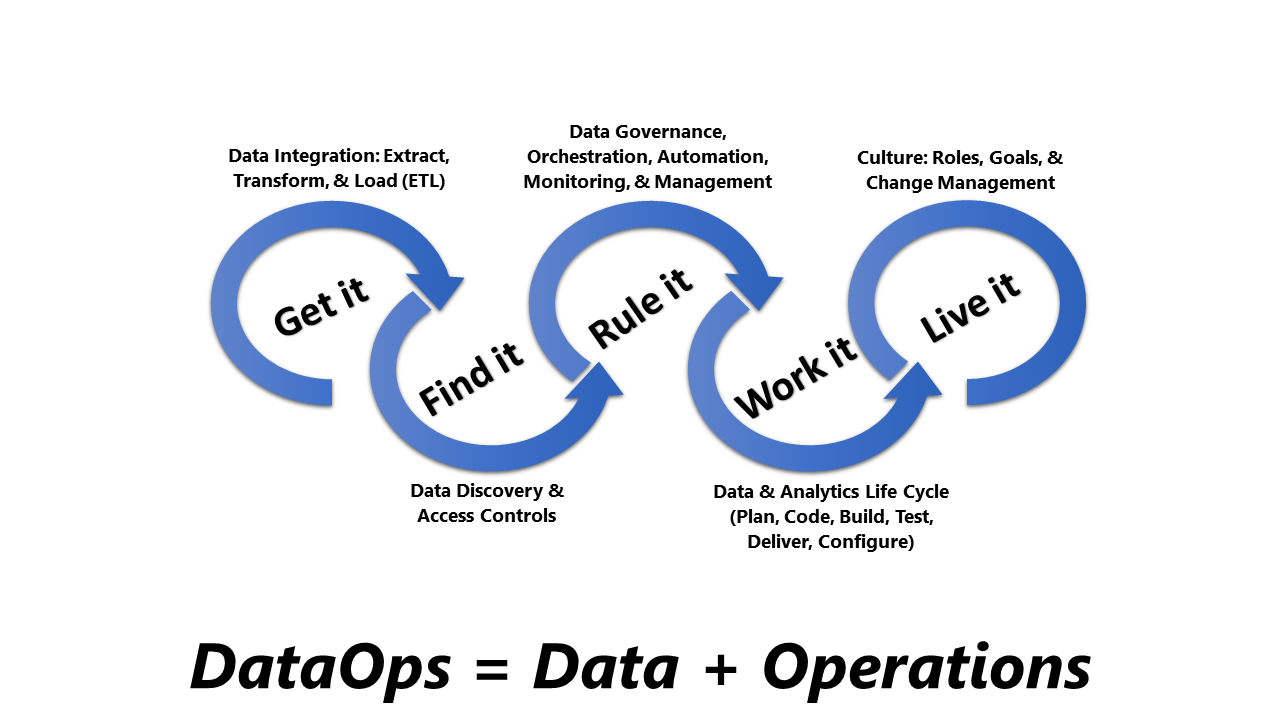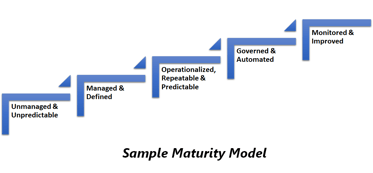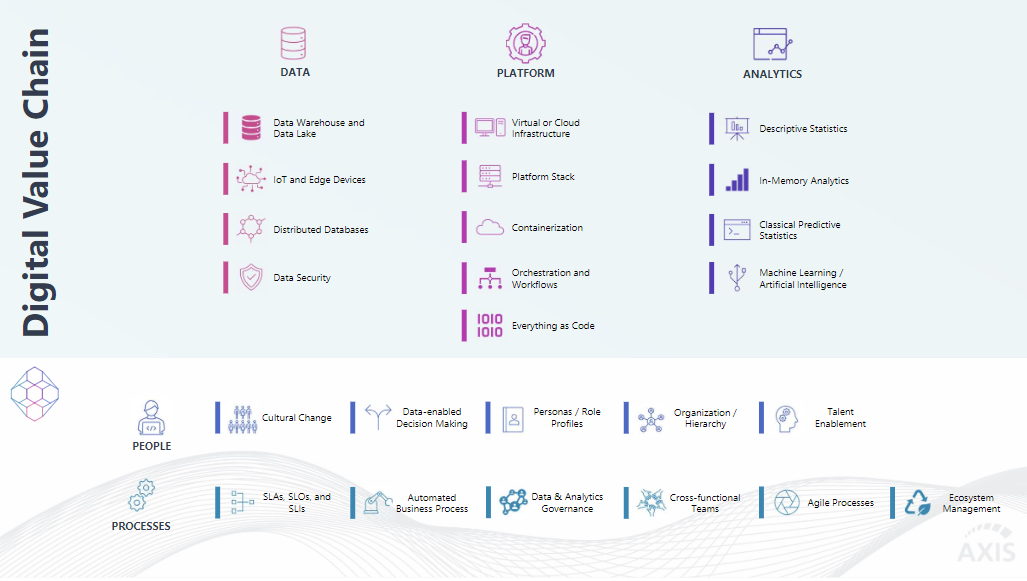Digital transformations are forcing businesses to scale and restructure their data and analytics practices to support strategic initiatives tied to driving innovation and responding to change in a faster, more resilient way. Underpinning it all is the growth in data demand, variety and complexity, the shift to cloud-based sources, and a call to speed data access to drive real business value.
DataOps is the leading approach to how enterprises are redesigning their technical infrastructure and business processes to meet growing expectations that more data should be more accessible more quickly.
Forrester defines DataOps as "the ability to enable solutions, develop data products, and activate data for business value across all technology tiers from infrastructure to experience." Similarly, Gartner describes the shift to DataOps this way: “Pressure to deliver faster, with higher quality and with resiliency in the face of constant change, is causing data and analytics leaders to rethink how their teams are organized and how they work. Traditional waterfall-oriented methodologies aren’t meeting the need — the distance between requirements definition and delivery of value is too great, the time required too long, and too many critical tasks get lost or degraded across role and team silos. DataOps techniques can address these challenges through a more agile, collaborative and change-friendly approach to building and managing data pipelines.”
In this article, we review the concept of DataOps and discuss why enterprises should embrace this approach to build out a modern data architecture.

Understanding DataOps
Simply put, DataOps is a combination of cultural philosophies, practices and tools that aims to accelerate the time-to-insight of data and analytics, while simultaneously increasing the confidence of data consumers in the data, the underlying data platform, and across the entire Digital Value Chain.
Why is DataOps Important?
Through DataOps, an enterprise can architect a strong foundation for how data and analytics is managed, engineered, and integrated effectively to ensure that business functions can achieve higher quality deliverables, improve employee and customer experiences, shorten time to value, create less waste and risk, and allow for more flexible business outcomes. It seeks to improve the way data is managed and products are created and maintained in line with business goals.
What are the Goals of DataOps?
The high-level goals of DataOps can be broadly grouped into two categories: accelerating time-to-insight and improving confidence in data and systems.
Accelerate time-to-insight
Like DevOps has done to transform continuous delivery of reliable software code, a core tenet of DataOps is enabling “agile” collaboration to deliver data pipelines. This improves alignment, reduces the risk of misunderstanding and improves incremental delivery of value. Collaboration between data owners, developers, and data consumers not only injects empathy, but also enables new insights regarding data and analytics requirements. A DataOps approach also reduces the time required to design, build, test, and deploy analytics solutions, and can free up skilled technical resources to pursue new insights by minimizing the effort required to operate and maintain existing solutions by driving more self-service by the business.
Increase confidence in data and data platforms
Another important goal for DataOps is improving developer and consumer (end user) confidence in the platforms, the data and the resulting analytics. Through automation, observability and anomaly detection, DataOps reduces human error by proactively identifying—and often remediating—issues in a defined and repeatable way leading to more predictable results. DataOps also incorporates governance over data sources and data orchestration (how data flows through technology platforms via specified data pipelines). By improving the performance, reliability and resilience of these platforms, data is delivered to consumers more quickly and reliably so they can actually use it to drive new insights.
How is DataOps Different from DevOps?
While this rapidly emerging discipline is heavily rooted in the principles of DevOps, agile software development and lean manufacturing, DataOps is fundamentally different from each of these. While DevOps focuses on continuous, reliable delivery of software code and applications, DataOps adapts it to continuous delivery of data and analytics. To achieve this, DataOps needs a broader scope and implicates business (not just technical) functional roles, where both collaborate to develop and maintain data flows and enable the continuous flow of useful data across the organization.
DataOps combines and adapts aspects of several disciplines:
- The iterative development and collaborative approach of agile
- The automated build, testing and deployment principles of DevOps
- Various operational processes of monitoring, measurement and improvement from lean manufacturing
A key difference is that DataOps also automates the execution of operational processes, in the form of complex data processing pipelines, via orchestration technology. This orchestration is also utilized to enable complex integration testing (prior to deployment), process validation (immediately following deployment), and even the ongoing operational testing of data pipelines in production.
How to Implement DataOps
 A successful DataOps program must consider people, process and technology factors, and the effectiveness of a DataOps program should be evaluated by a maturity model as part of a continuous improvement program. There are both top-down and bottom-up approaches to implementing DataOps, and each approach has its own set of distinct challenges. As with other maturity models, the initial state may be one of chaos and limited standardization or automation. Then, as repeatable best practices, new roles, and technologies are introduced and integrated into the organization, higher states of maturity may be realized.
A successful DataOps program must consider people, process and technology factors, and the effectiveness of a DataOps program should be evaluated by a maturity model as part of a continuous improvement program. There are both top-down and bottom-up approaches to implementing DataOps, and each approach has its own set of distinct challenges. As with other maturity models, the initial state may be one of chaos and limited standardization or automation. Then, as repeatable best practices, new roles, and technologies are introduced and integrated into the organization, higher states of maturity may be realized.
Measuring the Value of DataOps
The essential measure of the value of DataOps is the extent to which new data pipelines yield fruitful business outcomes—revenues increased, costs saved and risks mitigated. Stories and wins from new data pipelines speak volumes about success.
But more detailed quantification is possible. Various measures and KPIs can be derived from technical metadata, project management data and company financials. From a technical perspective, this should begin with measuring the volume and throughput of data as it flows from source systems, through various processing steps, to various endpoints such as models, reports and Business Intelligence (BI) applications. As a DataOps platform becomes more mature, this metadata can include very detailed performance measurements, frequency and diagnostic information of operational issues, use of Machine Learning (ML) to identify anomalies in both source data and technical processes, automated root cause analysis via correlation, and even automated remediation of issues as they occur.
From a business perspective, project management data can be used to quantify the level of effort needed to onboard new data sources, develop new features, perform testing activities, or respond to operational incidents. Ultimately a company’s DataOps initiatives should lead to cost savings, in both time and materials, that will directly impact a company’s bottom line. In some cases, it may even be possible to quantify additional revenue generated by accelerating the generation of descriptive, diagnostic, predictive or prescriptive insights.
Accelerating Value Creation
Ultimately, DataOps can fuel business innovation and create competitive advantage for enterprises. As a business deploys DataOps, scaling up becomes easier, productivity and quality increase, and response times for new analytic requests improve. If you need to minimize unplanned work, reduce cycle time and improve overall quality, despite increasing levels of complexity across business functions, embrace DataOps.
Axis Group
Having a defined and repeatable process in place, like DataOps, not only provides guardrails to let you accelerate innovation, but also ensures a safety net for when issues arise. Axis Group can help define and implement a DataOps approach to address your challenges. Click here to schedule a free Discovery session.

